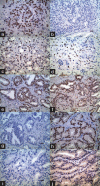Estrogen receptor (α and β) but not androgen receptor expression is correlated with recurrence, progression and survival in post prostatectomy T3N0M0 locally advanced prostate cancer in an urban Greek population
- PMID: 25219910
- PMCID: PMC4291886
- DOI: 10.4103/1008-682X.136445
Estrogen receptor (α and β) but not androgen receptor expression is correlated with recurrence, progression and survival in post prostatectomy T3N0M0 locally advanced prostate cancer in an urban Greek population
Abstract
The objective of this study was to evaluate the expression of estrogen receptors (ER(α) and ER(β)) and androgen receptors (ARs) as prognostic factors for biochemical recurrence, disease progression and survival in patients with pT3N0M0 prostate cancer (PCa) in an urban Greek population. A total of 100 consecutive patients with pT3N0M0 PCa treated with radical prostatectomy participated in the study. The mean age and follow-up were 64.2 and 6 years, respectively. The HSCORE was used for semi-quantitative analysis of the immunoreactivity of the receptors. The prognostic value of the ER(α) and ER(β) and AR was assessed in terms of recurrence, progression, and survival. AR expression was not associated with any of the above parameters; however, both ERs correlated with the prognosis. A univariate Cox regression analysis showed that ER(α) positive staining was significantly associated with a greater hazard for all outcomes. Increased ER(β) staining was significantly associated with a lower hazard for all outcomes in the univariate analysis. When both ER HSCORES were used for the analysis, it was found that patients with high ER(α) or low ER(β) HSCORES compared with patients with negatively stained ER(α) and >1.7 hSCORE ER(β) had 6.03, 10.93, and 10.53 times greater hazard for biochemical disease recurrence, progression of disease and death, respectively. Multiple Cox proportional hazard analyses showed that the age, preoperative prostate specific antigen, Gleason score and ERs were independent predictors of all outcomes. ER expression is an important prognosticator after radical prostatectomy in patients with pT3N0M0 PCa. By contrast, AR expression has limited prognostic value.
Figures


References
-
- Ferlay J, Steliarova-Foucher E, Lortet-Tieulent J, Rosso S, Coebergh JW, et al. Cancer incidence and mortality patterns in Europe: estimates for 40 countries in 2012. Eur J Cancer. 2013;49:1374–403. - PubMed
-
- Itsiopoulos C, Hodge A, Kaimakamis M. Can the Mediterranean diet prevent prostate cancer? Mol Nutr Food Res. 2009;53:227–39. - PubMed
-
- Tzonou A, Signorello LB, Lagiou P, Wuu J, Trichopoulos D, et al. Diet and cancer of the prostate: a case-control study in Greece. Int J Cancer. 1999;80:704–8. - PubMed
-
- Stamatiou K, Lardas M, Kostakos E, Koutsonasios V, Lepidas D. Prostate cancer screening in Greece: current facts. Urol J. 2009;6:157–61. - PubMed
-
- Bray F, Lortet-Tieulent J, Ferlay J, Forman D, Auvinen A. Prostate cancer incidence and mortality trends in 37 European countries: an overview. Eur J Cancer. 2010;46:3040–52. - PubMed
MeSH terms
Substances
LinkOut - more resources
Full Text Sources
Medical
Research Materials

